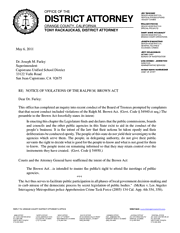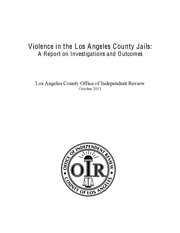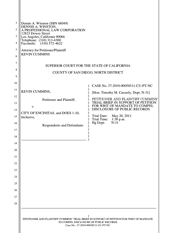California public records
A guide to your rights as a citizen
Cracking open the rules on closed sessions
Public agencies are allowed to meet in private to discuss issues such as litigation, real property purchases and labor negotiations. But they must disclose the topic in advance and make final decisions public.
Often, some of the most sensitive issues in local government are discussed behind closed doors in what is known as closed session. But the agency has to report action from such meetings, and those who want to know what happened behind the closed doors have rights.
Which matters can be discussed in a closed session meeting?
The Brown Act strictly limits the types of issues that qualify for a closed session meeting. The most common involve litigation, the purchase or sale of real property, personnel evaluations and labor negotiations. “The idea here is that the public is better off allowing this conversation to be out of the public view,” said Tom Newton, general counsel for the California Newspaper Publishers Assn. Newton added that although a city council or legislative body may discuss personnel matters in closed session, any decisions pertaining to employee compensation must be addressed and approved in open session.
Who can participate in a closed session?
Meetings cannot be “semi-private,” Newton said. A council cannot select certain public parties to participate while excluding others. However, outside consultants working for the city or agency are permitted to participate, as well as members of an agency’s staff. “You cannot have people in the closed session who are not members of your team,” said Michael Jenkins, city attorney for Diamond Bar, Hermosa Beach, Rolling Hills and West Hollywood, and president of the City Attorneys’ Department in the League of California Cities.
How can I keep track of decisions made in a closed session?
All items discussed in closed session must be listed on an agenda before the meeting, and the listing must include the California government code that the agency is citing to justify the closed session. “The first place to look is on the agenda of the meeting; those disclosures must be made,” Jenkins said. The agenda often provides basic information such as the location of a property the city is considering for purchase, or the title of a legal case in which the city is involved. And after a closed session, the agency must announce any final decisions it made during the session. In some cases, the council will wait until the start of its next meeting to make this announcement, Newton said.
Documents used in closed session may or may not be available through a public records request. Jenkins said many memos prepared by attorneys before the closed sessions and other reports used in the meetings would be exempt from public records laws because their disclosure could compromise the agency’s standing in litigation or negotiation. But any document executing a final decision — such as a legal settlement or a purchase agreement — is a public record, he said.
Are there any red flags I can look out for?
The most basic requirement is that the agency reports its closed sessions correctly and cites the correct government code, the attorneys said. “If you see a body going into a closed session and there’s no indication as to why — that’s an immediate problem,” Jenkins said. Moreover, members of the public must be given an opportunity to speak before the closed session begins, Newton said.
Another way for citizens to monitor closed session meetings is to pay attention to what a council reports after each session, Newton said. “If there are a lot of closed sessions without any action reported out, that would be a red flag,” he said.
Both attorneys suggested that citizens keep an eye out for personnel evaluations conducted in closed sessions. Jenkins said frequent or ongoing evaluation of a top staff member, such as a city manager, would be unusual. Newton said that any time a body moves to make an appointment or to hire a new employee, there must be a public discussion of that person’s compensation. “There has to be an open and public discussion about compensation,” he said.
Share your documents
If you have a public record you would like to share with The Times, attach it to an email to documents@latimes.com or mail it to 202 W. 1st St. Los Angeles, CA 90012, attention City Desk.
Reader-reported documents
About documents.latimes.com
The Times has published thousands of pages of public documents, ranging from Ruben Salazar’s killing to the Bell scandal. Track the Times’ latest at documents.latimes.com.



